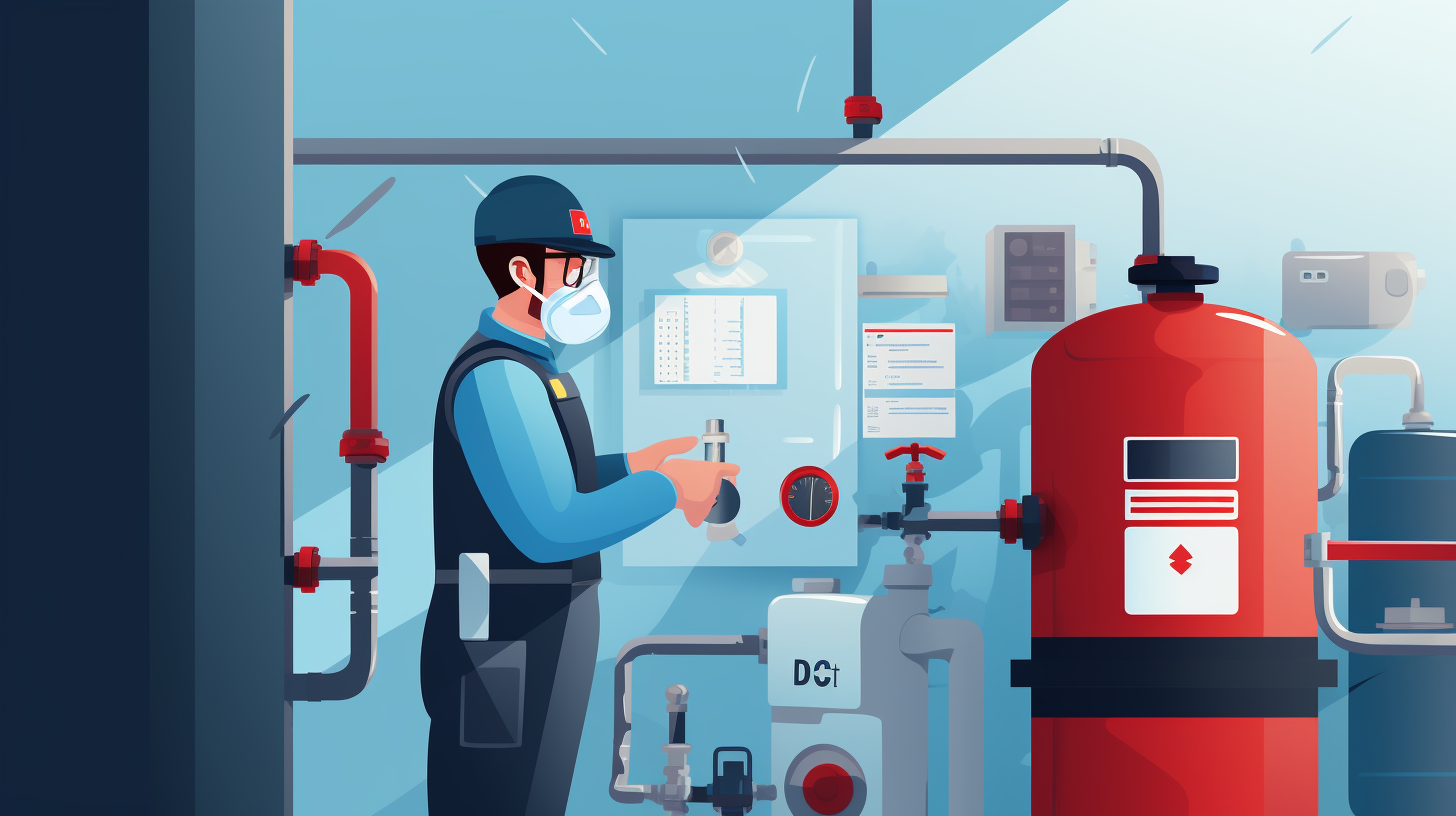In our article, we'll discuss the safety measures that matter when fixing a water heater.
We'll highlight the importance of wearing proper safety gear, ensuring adequate ventilation, and taking necessary electrical precautions.
Additionally, we'll explain the significance of shutting off the power before starting any repairs and preventing water leaks.
By following these safety guidelines, we can ensure a secure and successful water heater fixover.
Safety Gear Required
To ensure our safety during a water heater fixover, we must have the necessary safety gear. It's crucial to protect ourselves from any potential hazards that may arise during the process.
First and foremost, we need to wear appropriate eye protection, such as safety goggles, to shield our eyes from debris or chemicals that might be released.
Additionally, wearing gloves is essential to prevent any burns or injuries while handling hot components.
It's also important to have a fire extinguisher nearby, as a precautionary measure in case of a fire.
Lastly, a sturdy ladder or step stool should be used to access the water heater safely, avoiding any falls or accidents.
Proper Ventilation
For our safety during a water heater fixover, we need to ensure proper ventilation in the area. Adequate ventilation is essential to prevent the buildup of potentially harmful gases, such as carbon monoxide.
When gas or propane is used to fuel the water heater, it produces combustion byproducts that need to be properly vented outside. Without proper ventilation, these gases can accumulate indoors, leading to serious health risks.
To ensure proper ventilation, it's important to check the vents and flue pipes for any obstructions or damages. Make sure they're clear and in good condition. It's also crucial to follow the manufacturer's instructions for the installation and maintenance of the ventilation system.
Electrical Precautions
We prioritize electrical precautions to ensure our safety during a water heater fixover. When working with electricity, it's crucial to turn off the power supply at the breaker before beginning any repairs or maintenance. This simple step can prevent electrical shocks and other accidents.
Additionally, we recommend using insulated gloves and tools to further protect ourselves from potential electrical hazards. It's important to inspect the wiring and connections for any signs of damage or wear before proceeding with any repairs. If any issues are found, it's best to consult a licensed electrician for assistance.
Shutting off the Power
Turning off the power is essential for ensuring our safety during a water heater fixover. Before starting any work on the water heater, it's crucial to locate the circuit breaker or fuse box and switch off the power supply to the unit. This step is necessary to prevent any electrical shocks or accidents while working on the water heater.
It's important to note that simply turning off the power switch on the water heater itself isn't sufficient. By shutting off the power at the circuit breaker or fuse box, we're effectively cutting off the electricity supply to the entire unit. This precautionary measure will help protect us from any potential electrical hazards and ensure a safe working environment during the fixover process.
Preventing Water Leaks
To prevent water leaks during a water heater fixover, a crucial step is to ensure proper sealing of all connections. This is important because any loose or faulty connections can lead to water leakage, which can cause damage to the surrounding area and even result in flooding.
To ensure a tight seal, it's recommended to use high-quality pipe joint compound or thread seal tape on threaded connections. Additionally, it's essential to inspect all pipes, valves, and fittings for any signs of corrosion or wear and replace them if necessary.
Another important aspect is to check the temperature and pressure relief valve for any leaks or malfunctions and replace it if needed.
Frequently Asked Questions
What Are the Common Signs That Indicate a Water Heater Might Need to Be Fixed?
When it comes to fixing a water heater, one important aspect to consider is the common signs that indicate a potential problem.
These signs can include a lack of hot water, strange noises coming from the heater, a leaking tank, or a sudden increase in energy bills.
Recognizing these signs early on can help prevent further damage and ensure the safety of your water heating system.
Can I Fix a Water Heater Without Using Any Safety Gear?
No, we can't fix a water heater without using any safety gear. It's essential to prioritize our safety when working with water heaters.
Without proper safety gear, we risk burns, electrocution, and other accidents. Safety measures such as wearing gloves, goggles, and protective clothing are crucial to prevent injuries.
Additionally, turning off the power supply and shutting off the water before attempting any repairs is necessary to minimize potential hazards.
Are There Any Specific Safety Precautions to Take When Fixing a Gas Water Heater Compared to an Electric One?
When fixing a gas water heater compared to an electric one, there are specific safety precautions to consider.
It's crucial to turn off the gas supply and ensure proper ventilation to prevent gas leaks and potential explosions.
Additionally, wearing protective gloves and eyewear is essential to avoid burns and injuries while handling hot components.
Following manufacturer guidelines and seeking professional help when necessary are vital to ensure the safety of everyone involved.
How Can I Determine if My Water Heater Requires Professional Assistance or if I Can Fix It Myself?
Determining whether a water heater requires professional assistance or if it's something we can fix ourselves can be challenging. However, there are a few indicators we can consider.
If we notice any major leaks, strange noises, or a lack of hot water, it's usually best to call a professional plumber. Additionally, if we're uncomfortable working with gas or electricity, it's always safer to leave it to the experts.
Safety should be our top priority when dealing with water heater repairs.
Are There Any Specific Steps to Follow to Prevent Potential Gas Leaks When Fixing a Gas Water Heater?
When fixing a gas water heater, there are specific steps we must follow to prevent potential gas leaks.
First, we need to ensure that the gas supply is turned off before starting any work.
It's crucial to check for any gas odors and use a gas leak detector to confirm if there are any leaks.
Additionally, we should wear protective gear like gloves and safety goggles to protect ourselves from any accidents.
Taking these safety measures is essential to avoid any potential dangers during the fixover process.
Conclusion
In conclusion, when it comes to water heater fixover, it's crucial to prioritize safety measures.
Wearing the necessary safety gear, ensuring proper ventilation, taking electrical precautions, and shutting off the power are all essential steps.
Additionally, preventing water leaks is vital to avoid potential hazards.
By following these precautions, you can confidently and safely handle any water heater repairs or maintenance tasks.



